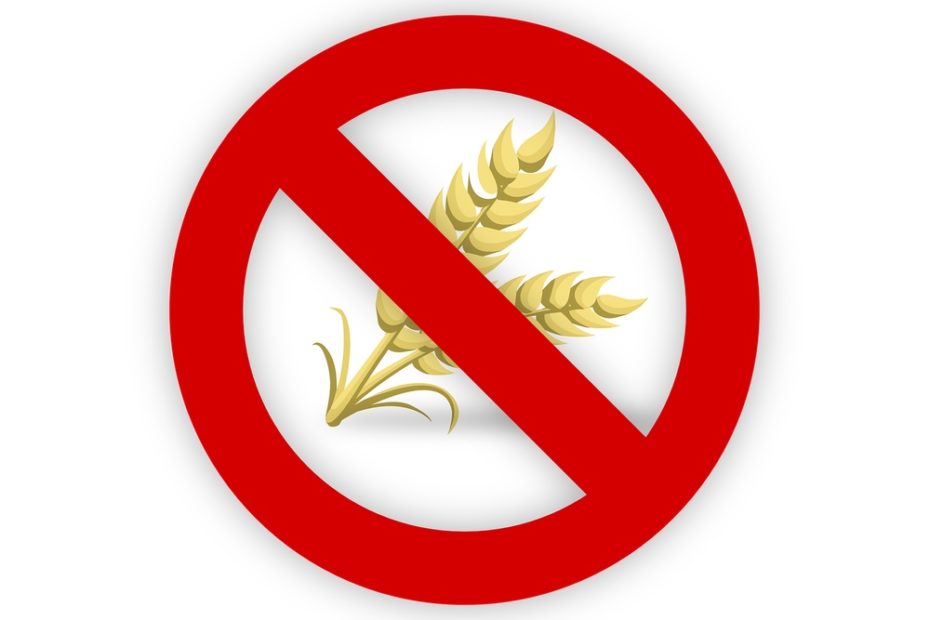The Basics
If you have coeliac disease, you should stay away from gluten. Gluten can be found in the grains wheat, rye, and barley.
Coeliac disease is a condition where your immune system mistakes gliadin (a component of gluten) as a threat to the body. It attacks the gluten and in the process your gut becomes inflamed. This inflammation inhibits proper nutrient absorption during digestion. (1)
When your gut cannot fully absorb nutrients from food, you can get diarrhoea, the most frequent symptom of coeliac disease. Other common symptoms include bloating, flatulence, indigestion, fatigue, and unintentional weight loss. (1)
There’s no treatment for the disease, and so the best course of action is to avoid glutenous foods.
What foods contain gluten and how can I tell?
Apart from the obvious contenders (e.g. bread, pasta), the offending grains can be found in a variety of foods, particularly processed foods like convenience meals. As well as bread and pasta, flour is commonly used to make cakes, pastries, tortilla, and flour thickened sauces.
This may seem restrictive, but the vast majority of unprocessed foods are absolutely fine to eat for those with coeliac. Meat, fish, fruit, vegetables, dairy, eggs, and other grains (e.g. rice) are all safe to eat. (2)
When shopping, you can tell if a food item contains gluten by looking at the ingredients list. All pre-packaged foods sold in the UK are legally required to list their ingredients, with common allergens (including gluten) in bold. (3) It’s worth reading the labels on complex preparations of food, like convenience meals, as glutenous grains can often crop up as minor ingredients. Many large supermarkets now have dedicated ‘free from…’ isles, where you can find gluten free alternatives to everyday staples like gluten free bread.
Some restaurants are on the ball when it comes to catering to gluten allergies, labelling suitable items on their menu as gluten free or even having an entirely separate menu. But many restaurants don’t do this, so it’s worth checking with the waiter if a dish is safe for you to eat.
What about drinks?
Most drinks are fine, but some are derived from wheat, barley, or rye and are therefore unsuitable. Among these offenders are barley squash and most beers, including lager, stout, and ales. (2)
Some drinks derived from these grains are heavily distilled or processed, removing any trace of gluten. For example, vodka can be made by fermenting wheat, barley, or rye, but the extensive distillation process does not allow any gluten to find its way into the bottle. (4) Glucose syrup is another example, although you probably wouldn’t want to drink it!
I’ve heard sourdough bread can be gluten-free. Is it safe for me to eat?
Although sourdough loaves can contain less gluten than their conventional counterparts, it’s best to stay away if you have coeliac.
Regular bread is made using yeast alone, whereas sourdough uses a culture of wild yeast and bacteria, called a ‘starter’. This combination of yeast and bacteria ferments the dough around it, and in the process breaks down gluten. (5)
Sourdough baked in the controlled environment of a lab has been shown to be safe for those with coeliac disease. (6) The difficulty is that sourdough you might bake at home or buy from a bakery has not been made in a lab, and as such the gluten content is unknown. Every baker makes it differently, and the level of gluten degradation can vary significantly. (7) Because of this uncertainty, it’s safer to stay away from sourdough bread.
Oats
Although oats do not contain gluten, they sometimes cause trouble for people with coeliac. There are two reasons for this.
Firstly, oats contain a protein called avenin, which is similar to gluten. Most people with coeliac are fine with avenin, but a few aren’t. (2)
Secondly, oats are often grown near or processed alongside wheat, barley, or rye, which can contaminate them with gluten. (2) Packets of gluten-free oats have been kept away from glutenous grains and are easily available.
References:
- National Health Service. Coeliac Disease. Available from: https://www.nhs.uk/conditions/coeliac-disease/ [Accessed 24th June 2020]
- Coeliac UK. The gluten free diet: All you need to know about the diet that will make you well again. Available from: https://www.coeliac.org.uk/information-and-support/living-gluten-free/the-gluten-free-diet/ [Accessed 24th June 2020]
- Food Standards Agency. Packaging and labelling. Available from: https://www.food.gov.uk/business-guidance/packaging-and-labelling [Accessed 24th June 2020]
- Beyond Coeliac. Is vodka gluten-free? Available from: https://www.beyondceliac.org/gluten-free-diet/is-it-gluten-free/liquor/vodka/#:~:text=OUR%20PARTNERS-,Is%20Vodka%20Gluten%2DFree%3F,because%20of%20the%20distillation%20process.[Accessed 24th June 2020]
- Nionelli L, Rizzello CG. Sourdough-Based Biotechnologies for the Production of Gluten-Free Foods. Foods. 2016;5(3):65. Published 2016 Sep 20. doi:10.3390/foods5030065
- Di Cagno R, Barbato M, Di Camillo C, et al. Gluten-free sourdough wheat baked goods appear safe for young celiac patients: a pilot study. J Pediatr Gastroenterol Nutr. 2010;51(6):777-783. doi:10.1097/MPG.0b013e3181f22ba4
- Thiele C, Grassl S, Gänzle M. Gluten hydrolysis and depolymerization during sourdough fermentation. J Agric Food Chem. 2004;52(5):1307-1314. doi:10.1021/jf034470z
